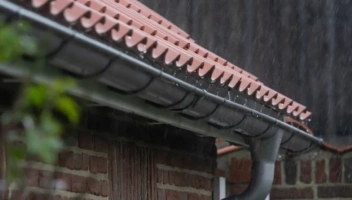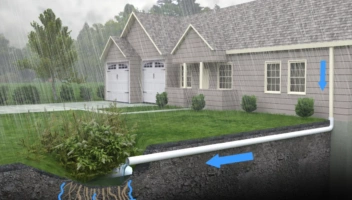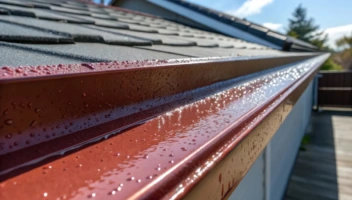Water Leaking Into Basement after Heavy Rain: How To Stop It

Is water leaking into your basement after heavy rain? If so, it’s a good idea to figure out why it keeps happening and put an end to it before your wallet washes away in a flood of repair bills.
Persistent basement leaks can lead to mold, mildew, and inhospitable conditions in your home. They can also lead to more serious structural damage if left untreated for too long, not to mention a drop in the value of your home.
There are numerous reasons that basements start leaking during or immediately after heavy storms, but all can be managed by following the tips in this article.
We’ll cover common causes of basement leaks below, so you can stop those pesky leaks from causing any additional damage.
In This Article:
- Why is Water Leaking into Your Basement?
- How to Stop Water From Leaking into Your Basement
- Frequently Asked Questions
Why is Water Leaking into Your Basement?

Here are a few common reasons water is leaking into your basement after heavy rain:
Window well woes
Window wells are a great feature for basements, providing natural light as well as a handy escape hatch in an emergency. However, a poorly maintained window well spells nothing but trouble where leaks are concerned.
Imagine that your window well’s filtering gravel is too clogged to allow water through, or broken window well walls yielding to the elements. If it’s been a while since you last maintained your window wells, you might not need to use your imagination—this might be the reality.
Hydrostatic pressure
With subsurface depth comes pressure from your surrounding environment. Soggy soil pressed heavily onto your basement walls helps water penetrate the smallest of cracks.
Before long, moisture works its way through to your basement’s interior.
Left unaddressed, water can wreak havoc on your home’s foundation through this constant pressure.
Clogged gutters
Although your home’s gutters may seem like the farthest things away from your basement, they play a pivotal role in protecting your indoor space from above.
Water caught up in clogged gutters often cascades over their edges, soaking into the soil below and saturating the area around your home’s foundation. These conditions are likely to result in a wet basement, but more significant damage is also a given if you give it enough time.
How to Stop Water From Leaking into Your Basement
The leaking threats mentioned above can be addressed with careful maintenance around your home and proactive improvement of the drainage conditions near your basement.
The ideas that follow go a long way toward minimizing moisture in your basement.
Check Your Gutters
Your gutters are the very first guardians of your home’s foundation. If they’re left to clog and corrode, you’ll end up with water where there shouldn’t be any. You should commit to cleaning out your gutters at least twice yearly to keep them debris-free.
Maintaining your gutters and downspouts can be relatively low cost and practically effortless with help from our completely enclosed gutter guard system. Professional installation guarantees your gutters remain clog-free, without all the fuss typically required of bi-annual gutter clean-outs.
Call us toll-free today at 1-855-315-8298 to learn more about the award-winning technology behind the LeafFilter gutter guard system,
Regrade and Reroute

Grading of soil above your basement can dramatically impact water drainage and the potential for hydrostatic pressure to push moisture into your home’s foundation.
If soil slopes inward toward your walls, pools are likely to form, and you could end up dealing with foundation damage down the line.
A simple DIY approach involves removing anything growing along your house’s walls above your basement and building up the soil to slope away from them. Your new slope should extend for ten feet or more and provide a drop of half a foot minimum to be effective.
This ensures water can safely flow away from your basement instead of compromising and infiltrating it.
Build a Better Barrier
You can restore your basement walls’ moisture-blocking properties from within by filling up cracks with an appropriate sealant. Smaller cracks can be handled with silicone caulking, but larger fissures in your walls or foundation will call for more advanced materials.
If you aren’t comfortable handling concrete sealing agents or hydraulic cement mixtures, we recommend calling in a professional for assistance. However, you can apply protective paint on your own once all the cracks and crevices have been filled.
You’ll need to make sure you use appropriate paint for the wet environment your walls will be subjected to. Opt for epoxy paint or paint made for masonry to ensure your walls are ready to weather storms without it all washing off.
Bolster Your Basement’s Defenses
🏡With our expert team and innovative technology, we'll have your LeafFilter system installed in no time! ⏱️Visit our website at https://t.co/wSLoW1tLsl to learn more about our fast and easy installation process and say goodbye to clogged gutters for good! 👋 pic.twitter.com/5SA4uoH7fp
— LeafFilter Gutter Protection (@LeafFilter) July 13, 2023
Heavy rain can cause basements in disrepair to leak and even flood, jeopardizing anything stored within and causing costly damage to your home in the process.
But, it’s not all gloom, doom, and damp surfaces. You can keep your basement from leaking by regularly performing the maintenance tasks described above. Just remember to ask a professional for help if you’re nervous about handling repair jobs on your own.
If you want to really get the jump on basement leaks and forgo the burden of cleaning out your gutters twice a year, consider LeafFilter gutter guards. Our award-winning system is a permanent solution to clogged gutters, making gutter maintenance easy.
Send us a message through our contact form to request a consultation, or reach out by phone at 1-800-290-6106 to get started.
Frequently Asked Questions
How serious is a leaky basement?
Leaky basements can bring about unsanitary conditions within your home, but they can also be precursors to more severe water damage.
If your basement is beginning to smell musty and you can see mold growing on walls, that’s not a good sign. If your walls are seeping and cracks appear to be forming, that’s even worse.
Consider taking action now before your issue gets out of hand (read: more costly to deal with).
Can you live with a leaky basement?
Your leaky basement may seem like a familiar friend if you’ve been procrastinating and ignoring the problem for some time. However, constant leaking leads to mold and mildew that can be hazardous to your family’s health.
You may be able to survive your leaky basement, but you shouldn’t live in a moldy environment longer than you have to.
How common is a wet basement?
Wet basements are big business in the US, with anything up to $50,000 typically spent on basement flooding repairs.
The American Society of Home Inspectors estimated as many as 60 percent of all homes in this country have wet basements. Plus, a sizable portion of these are also at risk of growing mold.
You probably know at least a few people who struggle to manage their wet basements. Regardless of how common it is, a wet basement isn’t something to ignore , as it can morph into more serious concerns without proper attention and remediation.


